Entrepreneurship and Small Business Management Report Analysis, UK
VerifiedAdded on 2021/01/02
|17
|4573
|98
Report
AI Summary
This report provides a comprehensive analysis of entrepreneurship and small business management. It begins with an introduction to entrepreneurship and its significance in economic and social growth, focusing on the UK context and the case of Joe Woods' IT business. The report then delves into various types of entrepreneurial ventures, including small-scale, large corporations, scalable, and social ventures, along with their relationship to different entrepreneurship typologies like intrapreneurs, serial entrepreneurs, and growth entrepreneurs. It further explores the similarities and differences between these ventures, considering aspects such as ownership, operational scope, and funding. The report also interprets relevant data and statistics to assess the impact of small and micro businesses on the economy, highlighting their contribution to employment and growth. Additionally, it examines the role of startups and small businesses in the social economy post-Brexit, the differentiating characteristics of successful entrepreneurs, the influence of entrepreneurial personalities, and how background and experience can affect entrepreneurship. The conclusion summarizes the key findings and insights.

Entrepreneurship and Small
Business Management
Business Management
Paraphrase This Document
Need a fresh take? Get an instant paraphrase of this document with our AI Paraphraser
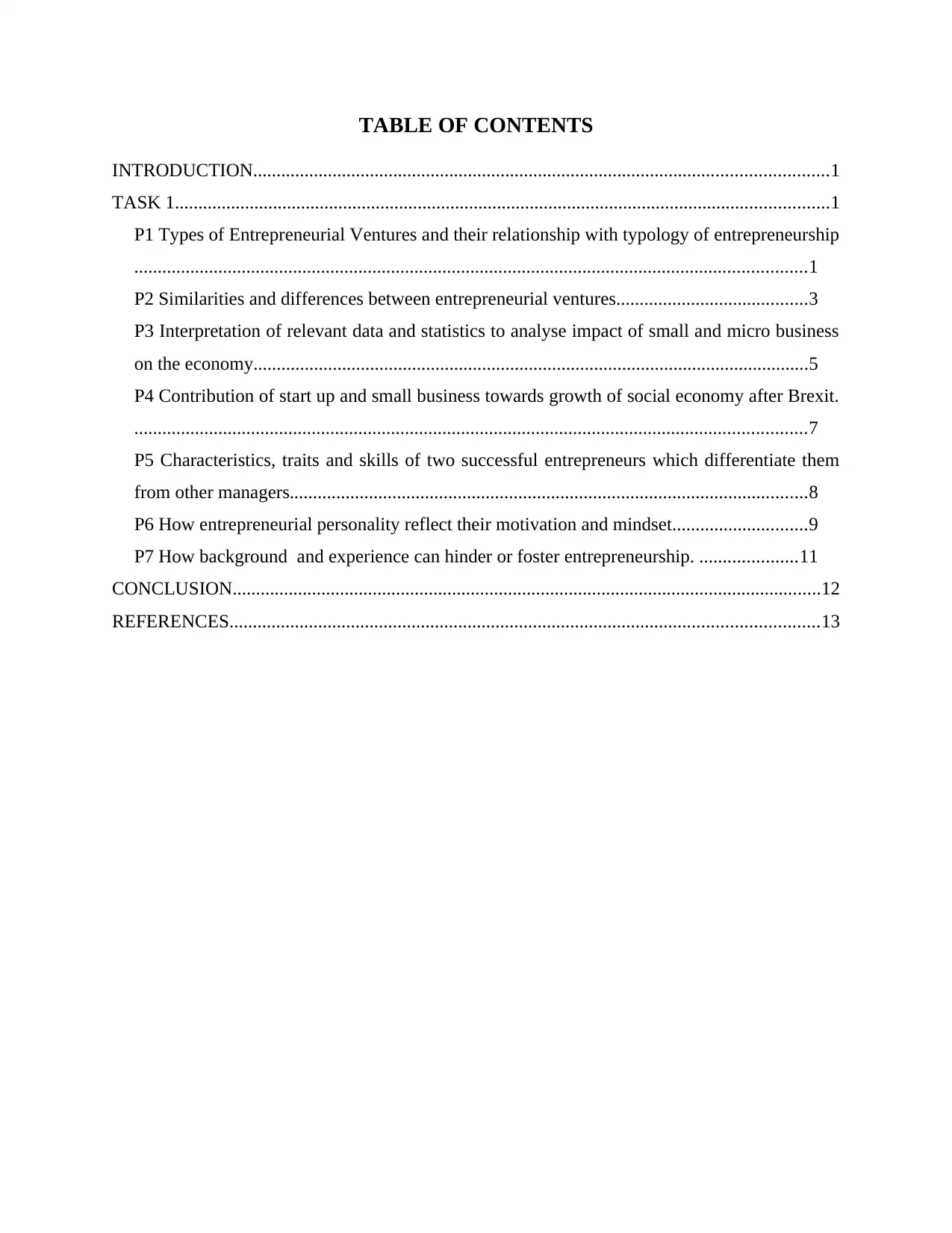
TABLE OF CONTENTS
INTRODUCTION...........................................................................................................................1
TASK 1............................................................................................................................................1
P1 Types of Entrepreneurial Ventures and their relationship with typology of entrepreneurship
................................................................................................................................................1
P2 Similarities and differences between entrepreneurial ventures.........................................3
P3 Interpretation of relevant data and statistics to analyse impact of small and micro business
on the economy.......................................................................................................................5
P4 Contribution of start up and small business towards growth of social economy after Brexit.
................................................................................................................................................7
P5 Characteristics, traits and skills of two successful entrepreneurs which differentiate them
from other managers...............................................................................................................8
P6 How entrepreneurial personality reflect their motivation and mindset.............................9
P7 How background and experience can hinder or foster entrepreneurship. .....................11
CONCLUSION..............................................................................................................................12
REFERENCES..............................................................................................................................13
INTRODUCTION...........................................................................................................................1
TASK 1............................................................................................................................................1
P1 Types of Entrepreneurial Ventures and their relationship with typology of entrepreneurship
................................................................................................................................................1
P2 Similarities and differences between entrepreneurial ventures.........................................3
P3 Interpretation of relevant data and statistics to analyse impact of small and micro business
on the economy.......................................................................................................................5
P4 Contribution of start up and small business towards growth of social economy after Brexit.
................................................................................................................................................7
P5 Characteristics, traits and skills of two successful entrepreneurs which differentiate them
from other managers...............................................................................................................8
P6 How entrepreneurial personality reflect their motivation and mindset.............................9
P7 How background and experience can hinder or foster entrepreneurship. .....................11
CONCLUSION..............................................................................................................................12
REFERENCES..............................................................................................................................13
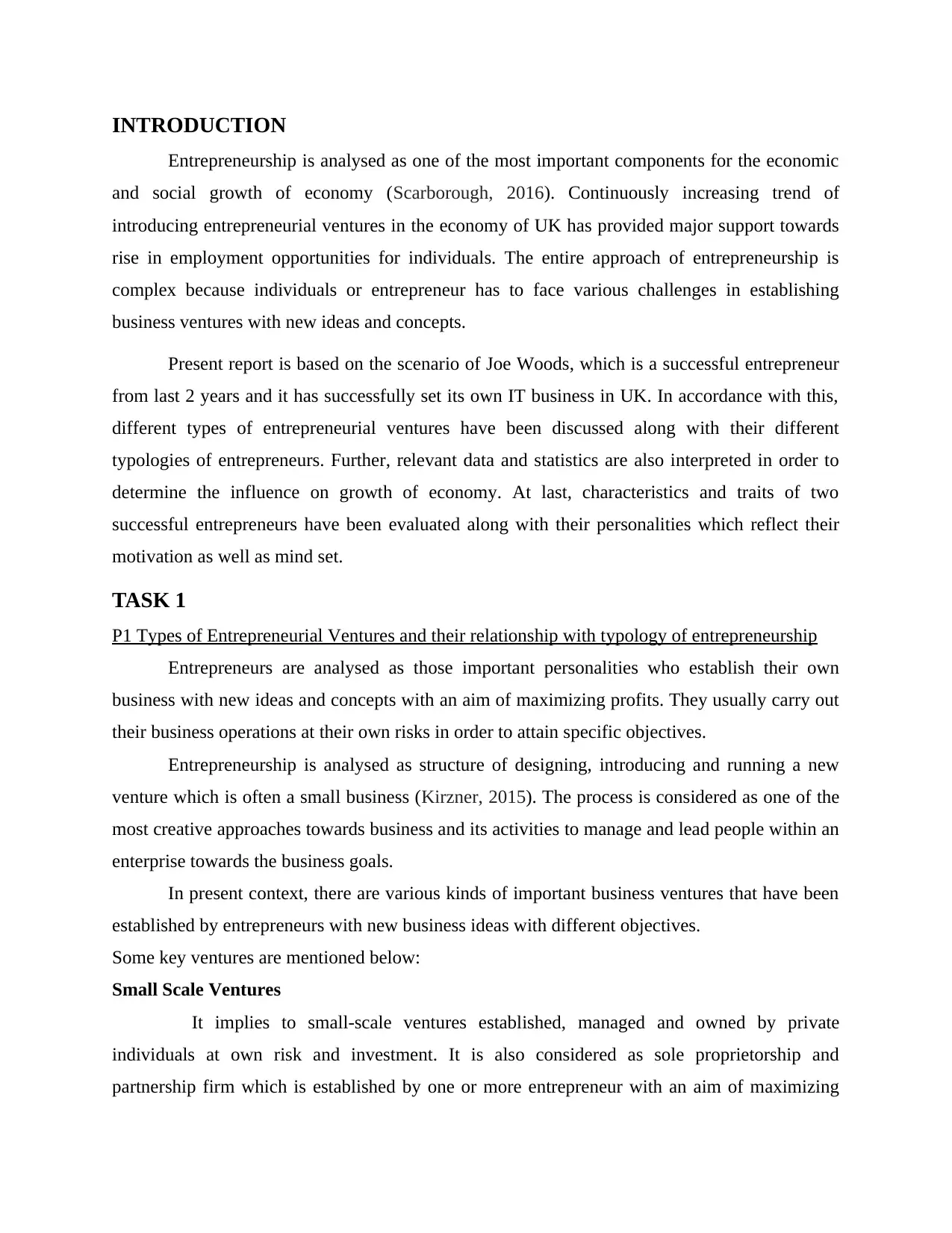
INTRODUCTION
Entrepreneurship is analysed as one of the most important components for the economic
and social growth of economy (Scarborough, 2016). Continuously increasing trend of
introducing entrepreneurial ventures in the economy of UK has provided major support towards
rise in employment opportunities for individuals. The entire approach of entrepreneurship is
complex because individuals or entrepreneur has to face various challenges in establishing
business ventures with new ideas and concepts.
Present report is based on the scenario of Joe Woods, which is a successful entrepreneur
from last 2 years and it has successfully set its own IT business in UK. In accordance with this,
different types of entrepreneurial ventures have been discussed along with their different
typologies of entrepreneurs. Further, relevant data and statistics are also interpreted in order to
determine the influence on growth of economy. At last, characteristics and traits of two
successful entrepreneurs have been evaluated along with their personalities which reflect their
motivation as well as mind set.
TASK 1
P1 Types of Entrepreneurial Ventures and their relationship with typology of entrepreneurship
Entrepreneurs are analysed as those important personalities who establish their own
business with new ideas and concepts with an aim of maximizing profits. They usually carry out
their business operations at their own risks in order to attain specific objectives.
Entrepreneurship is analysed as structure of designing, introducing and running a new
venture which is often a small business (Kirzner, 2015). The process is considered as one of the
most creative approaches towards business and its activities to manage and lead people within an
enterprise towards the business goals.
In present context, there are various kinds of important business ventures that have been
established by entrepreneurs with new business ideas with different objectives.
Some key ventures are mentioned below:
Small Scale Ventures
It implies to small-scale ventures established, managed and owned by private
individuals at own risk and investment. It is also considered as sole proprietorship and
partnership firm which is established by one or more entrepreneur with an aim of maximizing
Entrepreneurship is analysed as one of the most important components for the economic
and social growth of economy (Scarborough, 2016). Continuously increasing trend of
introducing entrepreneurial ventures in the economy of UK has provided major support towards
rise in employment opportunities for individuals. The entire approach of entrepreneurship is
complex because individuals or entrepreneur has to face various challenges in establishing
business ventures with new ideas and concepts.
Present report is based on the scenario of Joe Woods, which is a successful entrepreneur
from last 2 years and it has successfully set its own IT business in UK. In accordance with this,
different types of entrepreneurial ventures have been discussed along with their different
typologies of entrepreneurs. Further, relevant data and statistics are also interpreted in order to
determine the influence on growth of economy. At last, characteristics and traits of two
successful entrepreneurs have been evaluated along with their personalities which reflect their
motivation as well as mind set.
TASK 1
P1 Types of Entrepreneurial Ventures and their relationship with typology of entrepreneurship
Entrepreneurs are analysed as those important personalities who establish their own
business with new ideas and concepts with an aim of maximizing profits. They usually carry out
their business operations at their own risks in order to attain specific objectives.
Entrepreneurship is analysed as structure of designing, introducing and running a new
venture which is often a small business (Kirzner, 2015). The process is considered as one of the
most creative approaches towards business and its activities to manage and lead people within an
enterprise towards the business goals.
In present context, there are various kinds of important business ventures that have been
established by entrepreneurs with new business ideas with different objectives.
Some key ventures are mentioned below:
Small Scale Ventures
It implies to small-scale ventures established, managed and owned by private
individuals at own risk and investment. It is also considered as sole proprietorship and
partnership firm which is established by one or more entrepreneur with an aim of maximizing
⊘ This is a preview!⊘
Do you want full access?
Subscribe today to unlock all pages.

Trusted by 1+ million students worldwide

profits. When it comes to small business, UK has immense rate in the sprout of small-scale
ventures. It is important to determine that 99% of private sector enterprise in UK comes under
the category of small-scale ventures which employs almost 15.7 million individuals. For
example: Local and regional supermarkets, internet cafe, automotive companies and even small-
scale manufacturers constitutes Start-ups emerged in the last few years.
2
ventures. It is important to determine that 99% of private sector enterprise in UK comes under
the category of small-scale ventures which employs almost 15.7 million individuals. For
example: Local and regional supermarkets, internet cafe, automotive companies and even small-
scale manufacturers constitutes Start-ups emerged in the last few years.
2
Paraphrase This Document
Need a fresh take? Get an instant paraphrase of this document with our AI Paraphraser
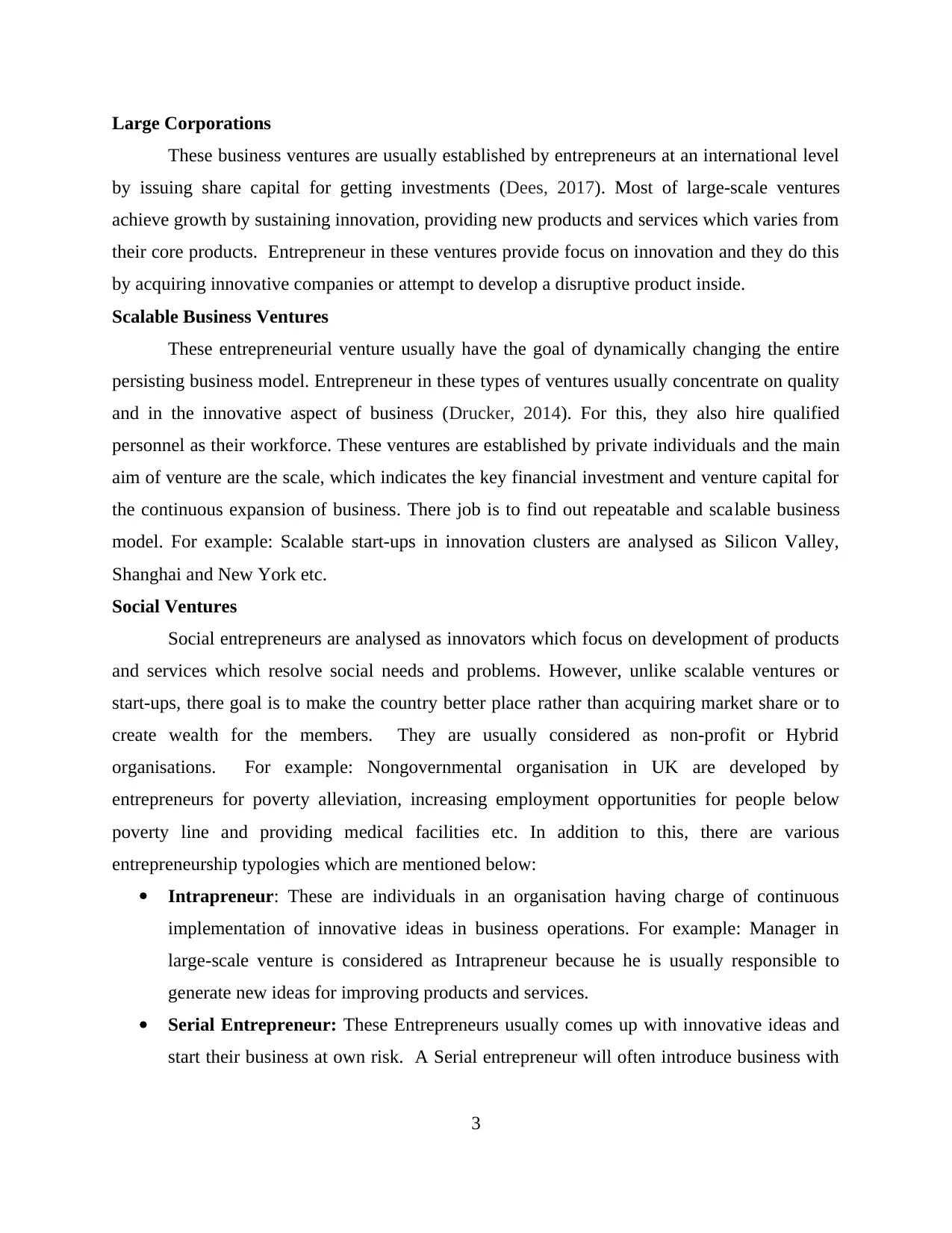
Large Corporations
These business ventures are usually established by entrepreneurs at an international level
by issuing share capital for getting investments (Dees, 2017). Most of large-scale ventures
achieve growth by sustaining innovation, providing new products and services which varies from
their core products. Entrepreneur in these ventures provide focus on innovation and they do this
by acquiring innovative companies or attempt to develop a disruptive product inside.
Scalable Business Ventures
These entrepreneurial venture usually have the goal of dynamically changing the entire
persisting business model. Entrepreneur in these types of ventures usually concentrate on quality
and in the innovative aspect of business (Drucker, 2014). For this, they also hire qualified
personnel as their workforce. These ventures are established by private individuals and the main
aim of venture are the scale, which indicates the key financial investment and venture capital for
the continuous expansion of business. There job is to find out repeatable and scalable business
model. For example: Scalable start-ups in innovation clusters are analysed as Silicon Valley,
Shanghai and New York etc.
Social Ventures
Social entrepreneurs are analysed as innovators which focus on development of products
and services which resolve social needs and problems. However, unlike scalable ventures or
start-ups, there goal is to make the country better place rather than acquiring market share or to
create wealth for the members. They are usually considered as non-profit or Hybrid
organisations. For example: Nongovernmental organisation in UK are developed by
entrepreneurs for poverty alleviation, increasing employment opportunities for people below
poverty line and providing medical facilities etc. In addition to this, there are various
entrepreneurship typologies which are mentioned below:
Intrapreneur: These are individuals in an organisation having charge of continuous
implementation of innovative ideas in business operations. For example: Manager in
large-scale venture is considered as Intrapreneur because he is usually responsible to
generate new ideas for improving products and services.
Serial Entrepreneur: These Entrepreneurs usually comes up with innovative ideas and
start their business at own risk. A Serial entrepreneur will often introduce business with
3
These business ventures are usually established by entrepreneurs at an international level
by issuing share capital for getting investments (Dees, 2017). Most of large-scale ventures
achieve growth by sustaining innovation, providing new products and services which varies from
their core products. Entrepreneur in these ventures provide focus on innovation and they do this
by acquiring innovative companies or attempt to develop a disruptive product inside.
Scalable Business Ventures
These entrepreneurial venture usually have the goal of dynamically changing the entire
persisting business model. Entrepreneur in these types of ventures usually concentrate on quality
and in the innovative aspect of business (Drucker, 2014). For this, they also hire qualified
personnel as their workforce. These ventures are established by private individuals and the main
aim of venture are the scale, which indicates the key financial investment and venture capital for
the continuous expansion of business. There job is to find out repeatable and scalable business
model. For example: Scalable start-ups in innovation clusters are analysed as Silicon Valley,
Shanghai and New York etc.
Social Ventures
Social entrepreneurs are analysed as innovators which focus on development of products
and services which resolve social needs and problems. However, unlike scalable ventures or
start-ups, there goal is to make the country better place rather than acquiring market share or to
create wealth for the members. They are usually considered as non-profit or Hybrid
organisations. For example: Nongovernmental organisation in UK are developed by
entrepreneurs for poverty alleviation, increasing employment opportunities for people below
poverty line and providing medical facilities etc. In addition to this, there are various
entrepreneurship typologies which are mentioned below:
Intrapreneur: These are individuals in an organisation having charge of continuous
implementation of innovative ideas in business operations. For example: Manager in
large-scale venture is considered as Intrapreneur because he is usually responsible to
generate new ideas for improving products and services.
Serial Entrepreneur: These Entrepreneurs usually comes up with innovative ideas and
start their business at own risk. A Serial entrepreneur will often introduce business with
3
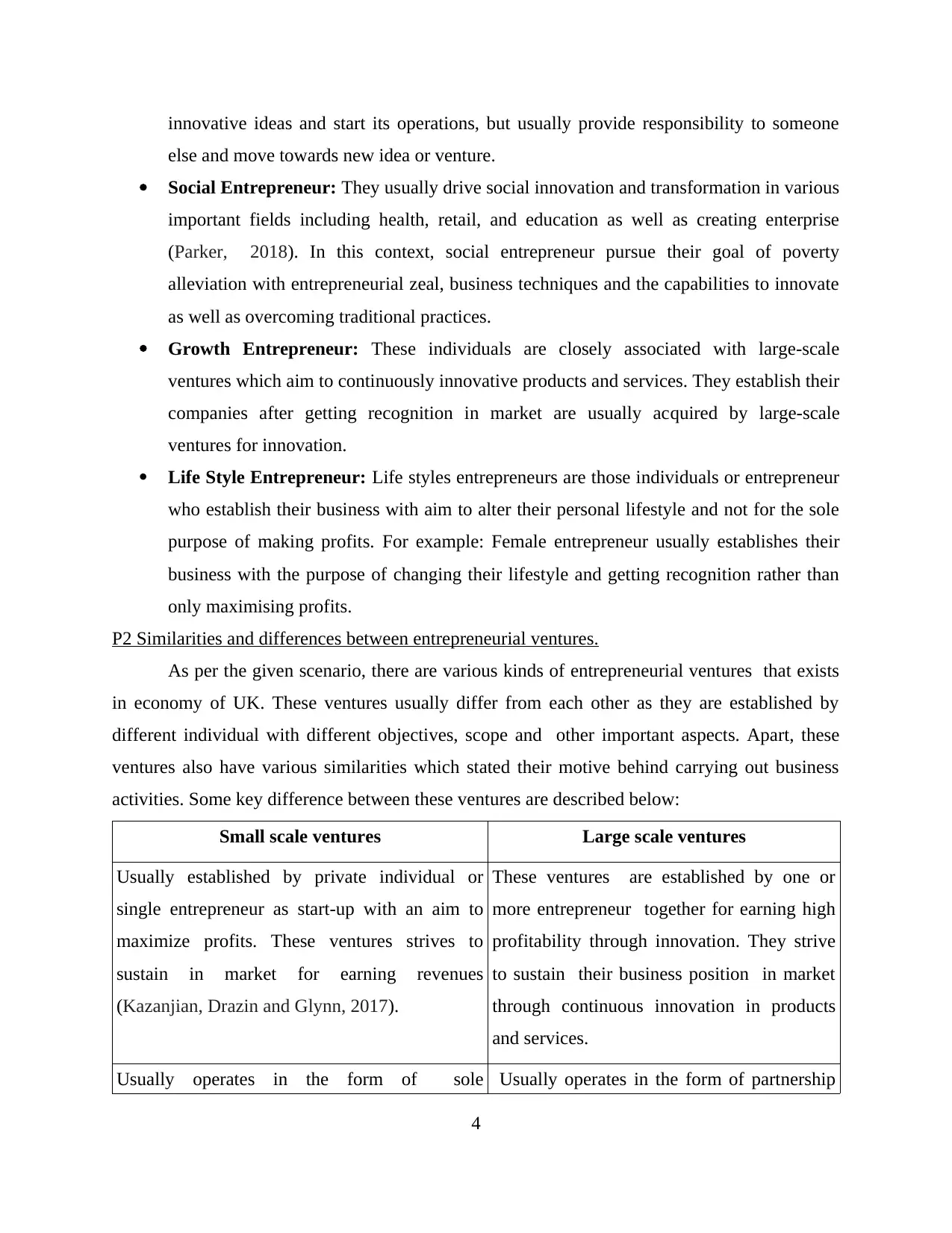
innovative ideas and start its operations, but usually provide responsibility to someone
else and move towards new idea or venture.
Social Entrepreneur: They usually drive social innovation and transformation in various
important fields including health, retail, and education as well as creating enterprise
(Parker, 2018). In this context, social entrepreneur pursue their goal of poverty
alleviation with entrepreneurial zeal, business techniques and the capabilities to innovate
as well as overcoming traditional practices.
Growth Entrepreneur: These individuals are closely associated with large-scale
ventures which aim to continuously innovative products and services. They establish their
companies after getting recognition in market are usually acquired by large-scale
ventures for innovation.
Life Style Entrepreneur: Life styles entrepreneurs are those individuals or entrepreneur
who establish their business with aim to alter their personal lifestyle and not for the sole
purpose of making profits. For example: Female entrepreneur usually establishes their
business with the purpose of changing their lifestyle and getting recognition rather than
only maximising profits.
P2 Similarities and differences between entrepreneurial ventures.
As per the given scenario, there are various kinds of entrepreneurial ventures that exists
in economy of UK. These ventures usually differ from each other as they are established by
different individual with different objectives, scope and other important aspects. Apart, these
ventures also have various similarities which stated their motive behind carrying out business
activities. Some key difference between these ventures are described below:
Small scale ventures Large scale ventures
Usually established by private individual or
single entrepreneur as start-up with an aim to
maximize profits. These ventures strives to
sustain in market for earning revenues
(Kazanjian, Drazin and Glynn, 2017).
These ventures are established by one or
more entrepreneur together for earning high
profitability through innovation. They strive
to sustain their business position in market
through continuous innovation in products
and services.
Usually operates in the form of sole Usually operates in the form of partnership
4
else and move towards new idea or venture.
Social Entrepreneur: They usually drive social innovation and transformation in various
important fields including health, retail, and education as well as creating enterprise
(Parker, 2018). In this context, social entrepreneur pursue their goal of poverty
alleviation with entrepreneurial zeal, business techniques and the capabilities to innovate
as well as overcoming traditional practices.
Growth Entrepreneur: These individuals are closely associated with large-scale
ventures which aim to continuously innovative products and services. They establish their
companies after getting recognition in market are usually acquired by large-scale
ventures for innovation.
Life Style Entrepreneur: Life styles entrepreneurs are those individuals or entrepreneur
who establish their business with aim to alter their personal lifestyle and not for the sole
purpose of making profits. For example: Female entrepreneur usually establishes their
business with the purpose of changing their lifestyle and getting recognition rather than
only maximising profits.
P2 Similarities and differences between entrepreneurial ventures.
As per the given scenario, there are various kinds of entrepreneurial ventures that exists
in economy of UK. These ventures usually differ from each other as they are established by
different individual with different objectives, scope and other important aspects. Apart, these
ventures also have various similarities which stated their motive behind carrying out business
activities. Some key difference between these ventures are described below:
Small scale ventures Large scale ventures
Usually established by private individual or
single entrepreneur as start-up with an aim to
maximize profits. These ventures strives to
sustain in market for earning revenues
(Kazanjian, Drazin and Glynn, 2017).
These ventures are established by one or
more entrepreneur together for earning high
profitability through innovation. They strive
to sustain their business position in market
through continuous innovation in products
and services.
Usually operates in the form of sole Usually operates in the form of partnership
4
⊘ This is a preview!⊘
Do you want full access?
Subscribe today to unlock all pages.

Trusted by 1+ million students worldwide
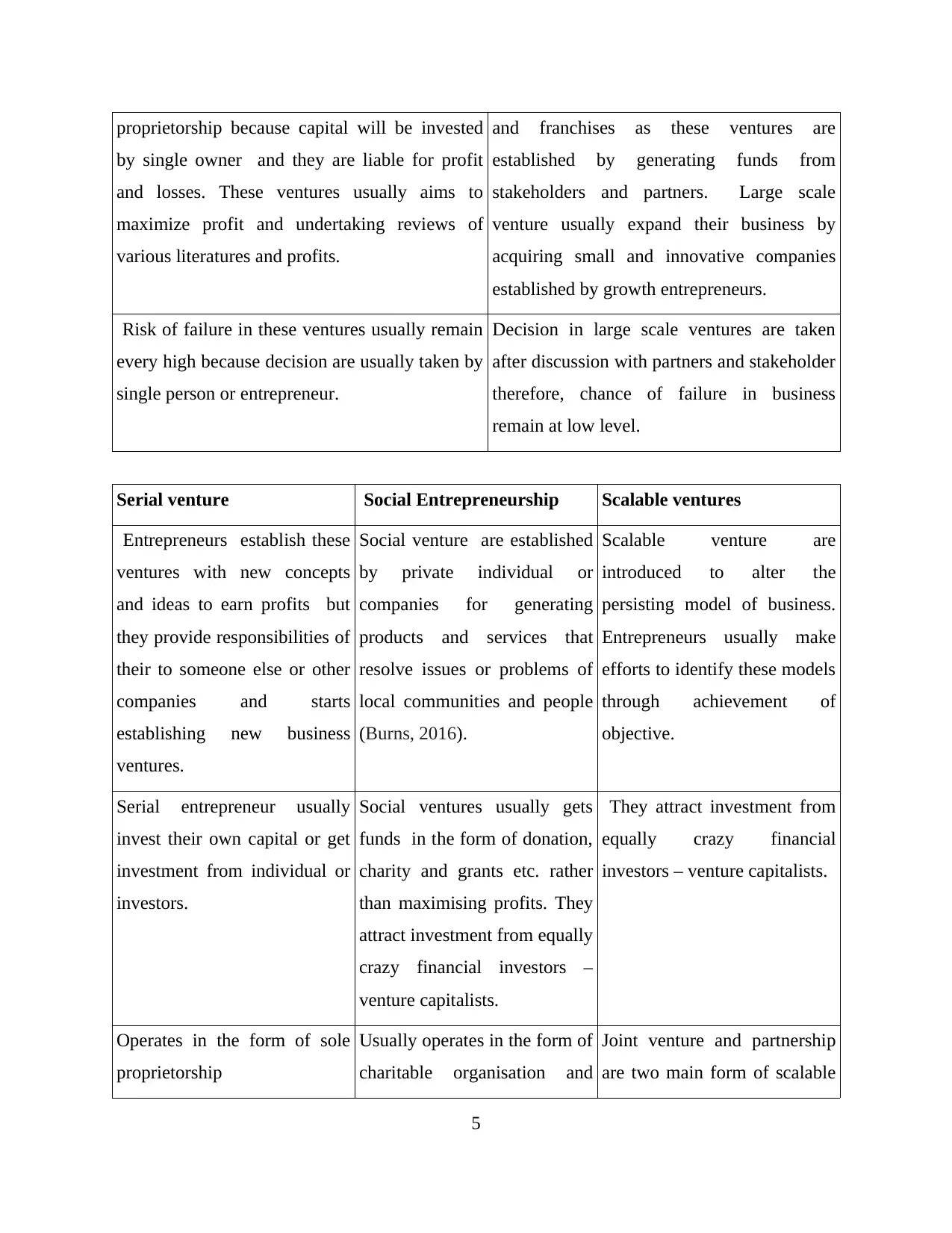
proprietorship because capital will be invested
by single owner and they are liable for profit
and losses. These ventures usually aims to
maximize profit and undertaking reviews of
various literatures and profits.
and franchises as these ventures are
established by generating funds from
stakeholders and partners. Large scale
venture usually expand their business by
acquiring small and innovative companies
established by growth entrepreneurs.
Risk of failure in these ventures usually remain
every high because decision are usually taken by
single person or entrepreneur.
Decision in large scale ventures are taken
after discussion with partners and stakeholder
therefore, chance of failure in business
remain at low level.
Serial venture Social Entrepreneurship Scalable ventures
Entrepreneurs establish these
ventures with new concepts
and ideas to earn profits but
they provide responsibilities of
their to someone else or other
companies and starts
establishing new business
ventures.
Social venture are established
by private individual or
companies for generating
products and services that
resolve issues or problems of
local communities and people
(Burns, 2016).
Scalable venture are
introduced to alter the
persisting model of business.
Entrepreneurs usually make
efforts to identify these models
through achievement of
objective.
Serial entrepreneur usually
invest their own capital or get
investment from individual or
investors.
Social ventures usually gets
funds in the form of donation,
charity and grants etc. rather
than maximising profits. They
attract investment from equally
crazy financial investors –
venture capitalists.
They attract investment from
equally crazy financial
investors – venture capitalists.
Operates in the form of sole
proprietorship
Usually operates in the form of
charitable organisation and
Joint venture and partnership
are two main form of scalable
5
by single owner and they are liable for profit
and losses. These ventures usually aims to
maximize profit and undertaking reviews of
various literatures and profits.
and franchises as these ventures are
established by generating funds from
stakeholders and partners. Large scale
venture usually expand their business by
acquiring small and innovative companies
established by growth entrepreneurs.
Risk of failure in these ventures usually remain
every high because decision are usually taken by
single person or entrepreneur.
Decision in large scale ventures are taken
after discussion with partners and stakeholder
therefore, chance of failure in business
remain at low level.
Serial venture Social Entrepreneurship Scalable ventures
Entrepreneurs establish these
ventures with new concepts
and ideas to earn profits but
they provide responsibilities of
their to someone else or other
companies and starts
establishing new business
ventures.
Social venture are established
by private individual or
companies for generating
products and services that
resolve issues or problems of
local communities and people
(Burns, 2016).
Scalable venture are
introduced to alter the
persisting model of business.
Entrepreneurs usually make
efforts to identify these models
through achievement of
objective.
Serial entrepreneur usually
invest their own capital or get
investment from individual or
investors.
Social ventures usually gets
funds in the form of donation,
charity and grants etc. rather
than maximising profits. They
attract investment from equally
crazy financial investors –
venture capitalists.
They attract investment from
equally crazy financial
investors – venture capitalists.
Operates in the form of sole
proprietorship
Usually operates in the form of
charitable organisation and
Joint venture and partnership
are two main form of scalable
5
Paraphrase This Document
Need a fresh take? Get an instant paraphrase of this document with our AI Paraphraser
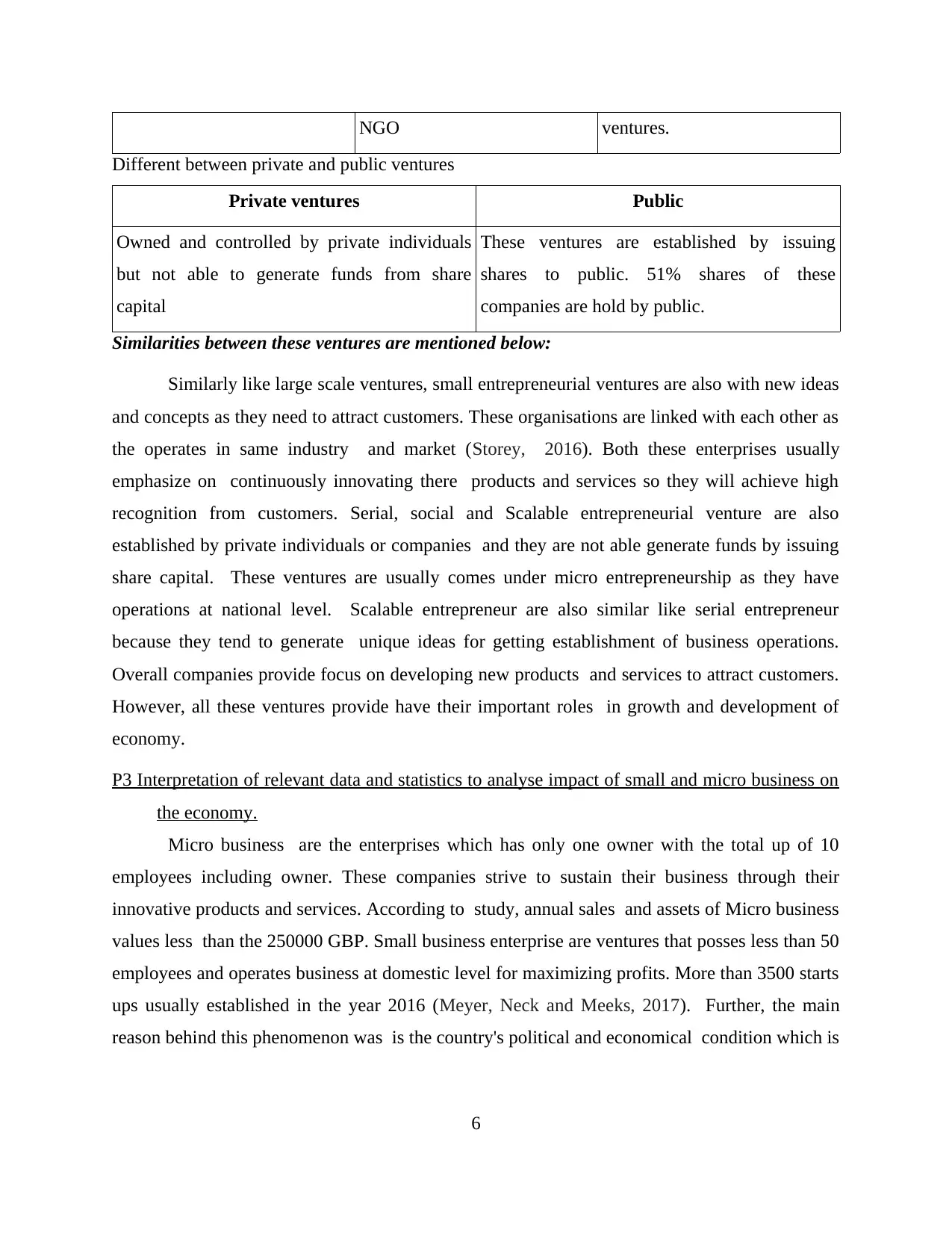
NGO ventures.
Different between private and public ventures
Private ventures Public
Owned and controlled by private individuals
but not able to generate funds from share
capital
These ventures are established by issuing
shares to public. 51% shares of these
companies are hold by public.
Similarities between these ventures are mentioned below:
Similarly like large scale ventures, small entrepreneurial ventures are also with new ideas
and concepts as they need to attract customers. These organisations are linked with each other as
the operates in same industry and market (Storey, 2016). Both these enterprises usually
emphasize on continuously innovating there products and services so they will achieve high
recognition from customers. Serial, social and Scalable entrepreneurial venture are also
established by private individuals or companies and they are not able generate funds by issuing
share capital. These ventures are usually comes under micro entrepreneurship as they have
operations at national level. Scalable entrepreneur are also similar like serial entrepreneur
because they tend to generate unique ideas for getting establishment of business operations.
Overall companies provide focus on developing new products and services to attract customers.
However, all these ventures provide have their important roles in growth and development of
economy.
P3 Interpretation of relevant data and statistics to analyse impact of small and micro business on
the economy.
Micro business are the enterprises which has only one owner with the total up of 10
employees including owner. These companies strive to sustain their business through their
innovative products and services. According to study, annual sales and assets of Micro business
values less than the 250000 GBP. Small business enterprise are ventures that posses less than 50
employees and operates business at domestic level for maximizing profits. More than 3500 starts
ups usually established in the year 2016 (Meyer, Neck and Meeks, 2017). Further, the main
reason behind this phenomenon was is the country's political and economical condition which is
6
Different between private and public ventures
Private ventures Public
Owned and controlled by private individuals
but not able to generate funds from share
capital
These ventures are established by issuing
shares to public. 51% shares of these
companies are hold by public.
Similarities between these ventures are mentioned below:
Similarly like large scale ventures, small entrepreneurial ventures are also with new ideas
and concepts as they need to attract customers. These organisations are linked with each other as
the operates in same industry and market (Storey, 2016). Both these enterprises usually
emphasize on continuously innovating there products and services so they will achieve high
recognition from customers. Serial, social and Scalable entrepreneurial venture are also
established by private individuals or companies and they are not able generate funds by issuing
share capital. These ventures are usually comes under micro entrepreneurship as they have
operations at national level. Scalable entrepreneur are also similar like serial entrepreneur
because they tend to generate unique ideas for getting establishment of business operations.
Overall companies provide focus on developing new products and services to attract customers.
However, all these ventures provide have their important roles in growth and development of
economy.
P3 Interpretation of relevant data and statistics to analyse impact of small and micro business on
the economy.
Micro business are the enterprises which has only one owner with the total up of 10
employees including owner. These companies strive to sustain their business through their
innovative products and services. According to study, annual sales and assets of Micro business
values less than the 250000 GBP. Small business enterprise are ventures that posses less than 50
employees and operates business at domestic level for maximizing profits. More than 3500 starts
ups usually established in the year 2016 (Meyer, Neck and Meeks, 2017). Further, the main
reason behind this phenomenon was is the country's political and economical condition which is
6
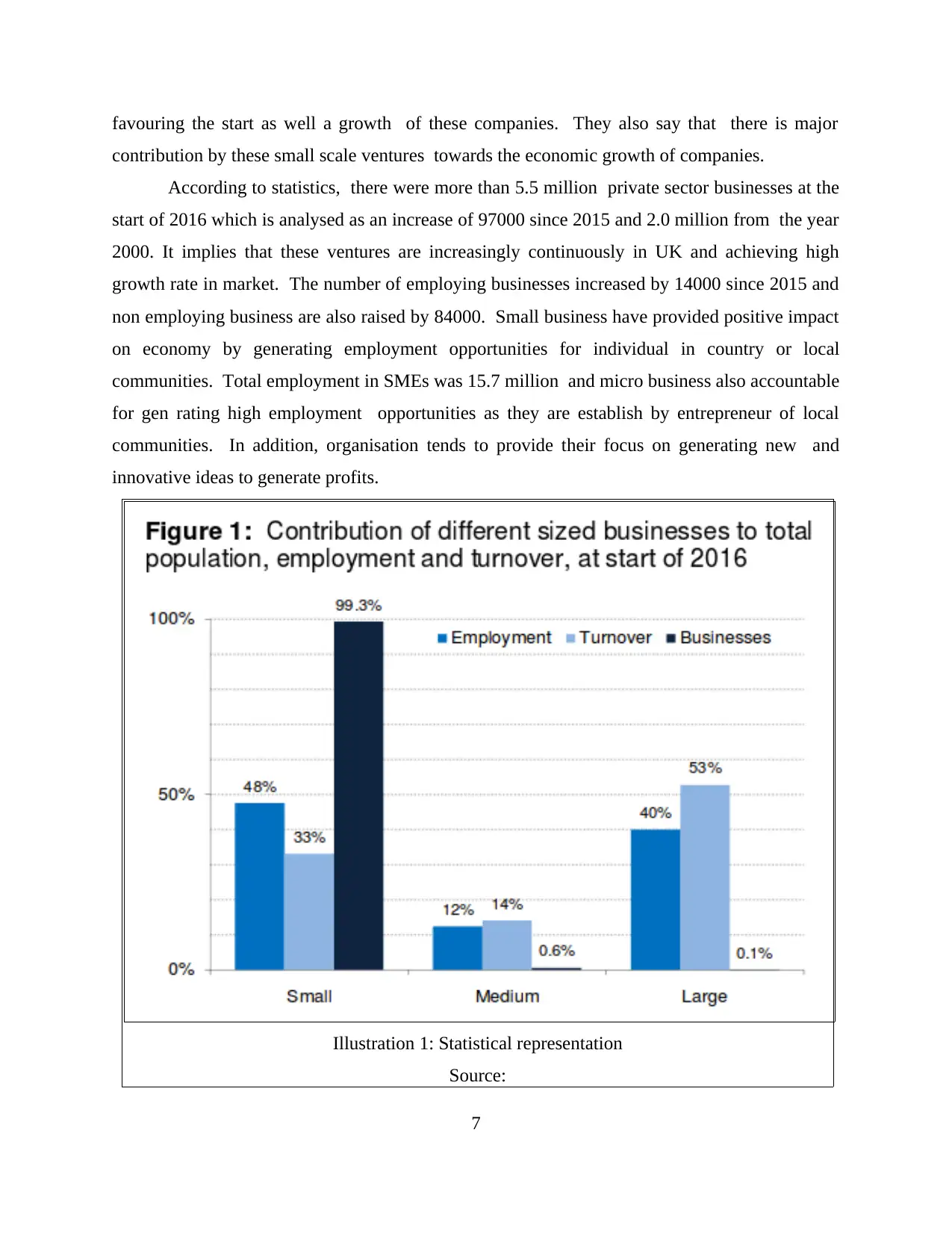
favouring the start as well a growth of these companies. They also say that there is major
contribution by these small scale ventures towards the economic growth of companies.
According to statistics, there were more than 5.5 million private sector businesses at the
start of 2016 which is analysed as an increase of 97000 since 2015 and 2.0 million from the year
2000. It implies that these ventures are increasingly continuously in UK and achieving high
growth rate in market. The number of employing businesses increased by 14000 since 2015 and
non employing business are also raised by 84000. Small business have provided positive impact
on economy by generating employment opportunities for individual in country or local
communities. Total employment in SMEs was 15.7 million and micro business also accountable
for gen rating high employment opportunities as they are establish by entrepreneur of local
communities. In addition, organisation tends to provide their focus on generating new and
innovative ideas to generate profits.
7
Illustration 1: Statistical representation
Source:
contribution by these small scale ventures towards the economic growth of companies.
According to statistics, there were more than 5.5 million private sector businesses at the
start of 2016 which is analysed as an increase of 97000 since 2015 and 2.0 million from the year
2000. It implies that these ventures are increasingly continuously in UK and achieving high
growth rate in market. The number of employing businesses increased by 14000 since 2015 and
non employing business are also raised by 84000. Small business have provided positive impact
on economy by generating employment opportunities for individual in country or local
communities. Total employment in SMEs was 15.7 million and micro business also accountable
for gen rating high employment opportunities as they are establish by entrepreneur of local
communities. In addition, organisation tends to provide their focus on generating new and
innovative ideas to generate profits.
7
Illustration 1: Statistical representation
Source:
⊘ This is a preview!⊘
Do you want full access?
Subscribe today to unlock all pages.

Trusted by 1+ million students worldwide
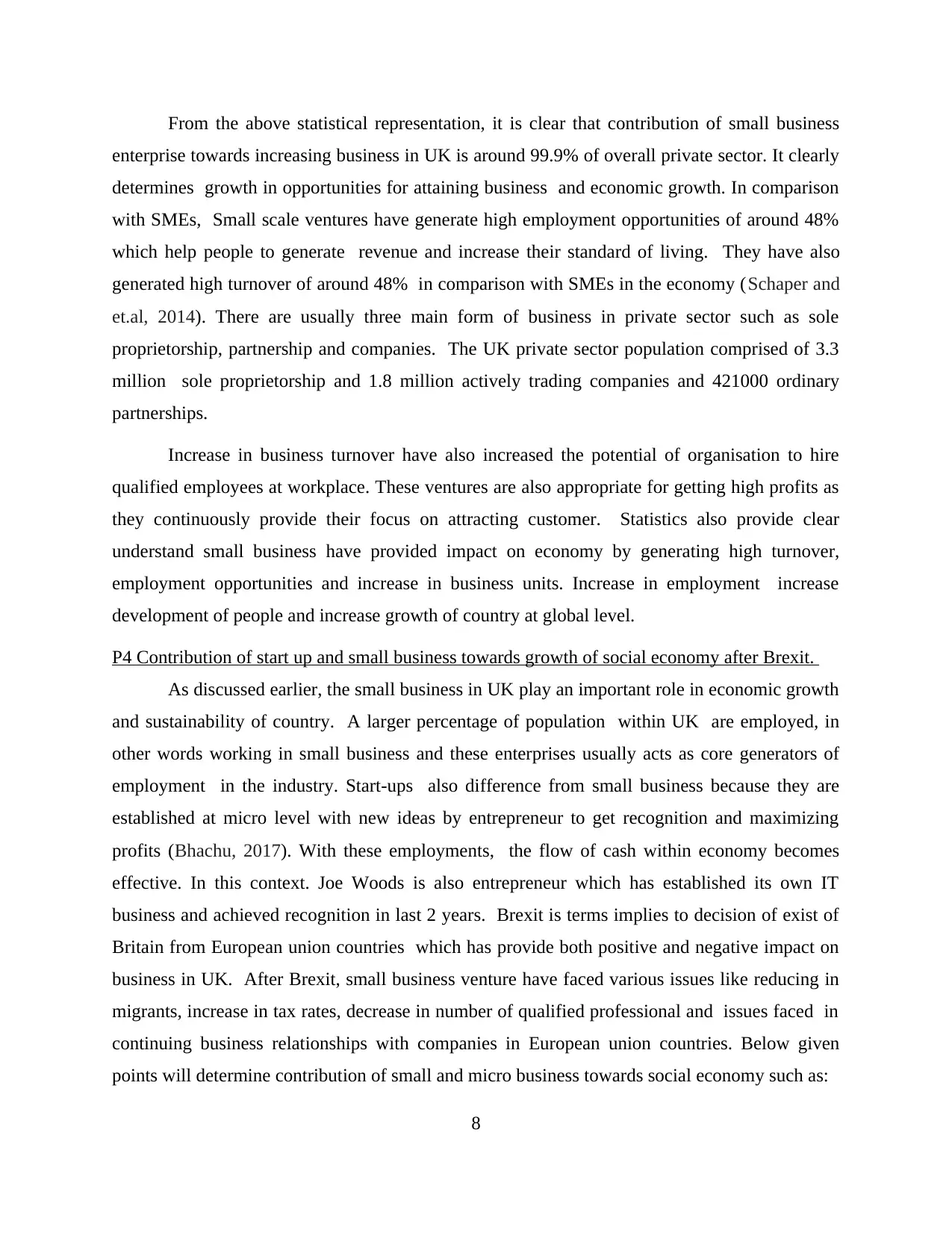
From the above statistical representation, it is clear that contribution of small business
enterprise towards increasing business in UK is around 99.9% of overall private sector. It clearly
determines growth in opportunities for attaining business and economic growth. In comparison
with SMEs, Small scale ventures have generate high employment opportunities of around 48%
which help people to generate revenue and increase their standard of living. They have also
generated high turnover of around 48% in comparison with SMEs in the economy (Schaper and
et.al, 2014). There are usually three main form of business in private sector such as sole
proprietorship, partnership and companies. The UK private sector population comprised of 3.3
million sole proprietorship and 1.8 million actively trading companies and 421000 ordinary
partnerships.
Increase in business turnover have also increased the potential of organisation to hire
qualified employees at workplace. These ventures are also appropriate for getting high profits as
they continuously provide their focus on attracting customer. Statistics also provide clear
understand small business have provided impact on economy by generating high turnover,
employment opportunities and increase in business units. Increase in employment increase
development of people and increase growth of country at global level.
P4 Contribution of start up and small business towards growth of social economy after Brexit.
As discussed earlier, the small business in UK play an important role in economic growth
and sustainability of country. A larger percentage of population within UK are employed, in
other words working in small business and these enterprises usually acts as core generators of
employment in the industry. Start-ups also difference from small business because they are
established at micro level with new ideas by entrepreneur to get recognition and maximizing
profits (Bhachu, 2017). With these employments, the flow of cash within economy becomes
effective. In this context. Joe Woods is also entrepreneur which has established its own IT
business and achieved recognition in last 2 years. Brexit is terms implies to decision of exist of
Britain from European union countries which has provide both positive and negative impact on
business in UK. After Brexit, small business venture have faced various issues like reducing in
migrants, increase in tax rates, decrease in number of qualified professional and issues faced in
continuing business relationships with companies in European union countries. Below given
points will determine contribution of small and micro business towards social economy such as:
8
enterprise towards increasing business in UK is around 99.9% of overall private sector. It clearly
determines growth in opportunities for attaining business and economic growth. In comparison
with SMEs, Small scale ventures have generate high employment opportunities of around 48%
which help people to generate revenue and increase their standard of living. They have also
generated high turnover of around 48% in comparison with SMEs in the economy (Schaper and
et.al, 2014). There are usually three main form of business in private sector such as sole
proprietorship, partnership and companies. The UK private sector population comprised of 3.3
million sole proprietorship and 1.8 million actively trading companies and 421000 ordinary
partnerships.
Increase in business turnover have also increased the potential of organisation to hire
qualified employees at workplace. These ventures are also appropriate for getting high profits as
they continuously provide their focus on attracting customer. Statistics also provide clear
understand small business have provided impact on economy by generating high turnover,
employment opportunities and increase in business units. Increase in employment increase
development of people and increase growth of country at global level.
P4 Contribution of start up and small business towards growth of social economy after Brexit.
As discussed earlier, the small business in UK play an important role in economic growth
and sustainability of country. A larger percentage of population within UK are employed, in
other words working in small business and these enterprises usually acts as core generators of
employment in the industry. Start-ups also difference from small business because they are
established at micro level with new ideas by entrepreneur to get recognition and maximizing
profits (Bhachu, 2017). With these employments, the flow of cash within economy becomes
effective. In this context. Joe Woods is also entrepreneur which has established its own IT
business and achieved recognition in last 2 years. Brexit is terms implies to decision of exist of
Britain from European union countries which has provide both positive and negative impact on
business in UK. After Brexit, small business venture have faced various issues like reducing in
migrants, increase in tax rates, decrease in number of qualified professional and issues faced in
continuing business relationships with companies in European union countries. Below given
points will determine contribution of small and micro business towards social economy such as:
8
Paraphrase This Document
Need a fresh take? Get an instant paraphrase of this document with our AI Paraphraser
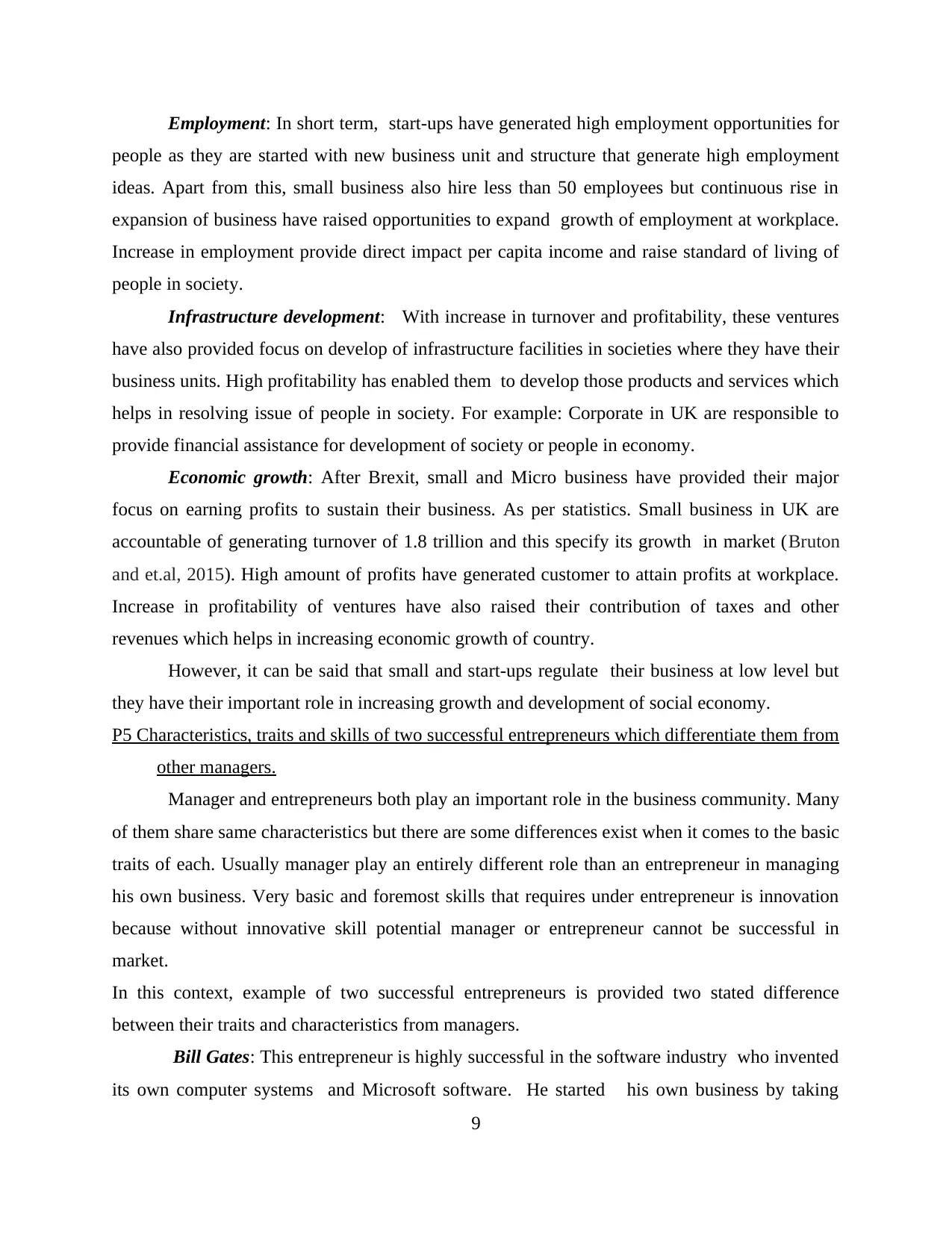
Employment: In short term, start-ups have generated high employment opportunities for
people as they are started with new business unit and structure that generate high employment
ideas. Apart from this, small business also hire less than 50 employees but continuous rise in
expansion of business have raised opportunities to expand growth of employment at workplace.
Increase in employment provide direct impact per capita income and raise standard of living of
people in society.
Infrastructure development: With increase in turnover and profitability, these ventures
have also provided focus on develop of infrastructure facilities in societies where they have their
business units. High profitability has enabled them to develop those products and services which
helps in resolving issue of people in society. For example: Corporate in UK are responsible to
provide financial assistance for development of society or people in economy.
Economic growth: After Brexit, small and Micro business have provided their major
focus on earning profits to sustain their business. As per statistics. Small business in UK are
accountable of generating turnover of 1.8 trillion and this specify its growth in market (Bruton
and et.al, 2015). High amount of profits have generated customer to attain profits at workplace.
Increase in profitability of ventures have also raised their contribution of taxes and other
revenues which helps in increasing economic growth of country.
However, it can be said that small and start-ups regulate their business at low level but
they have their important role in increasing growth and development of social economy.
P5 Characteristics, traits and skills of two successful entrepreneurs which differentiate them from
other managers.
Manager and entrepreneurs both play an important role in the business community. Many
of them share same characteristics but there are some differences exist when it comes to the basic
traits of each. Usually manager play an entirely different role than an entrepreneur in managing
his own business. Very basic and foremost skills that requires under entrepreneur is innovation
because without innovative skill potential manager or entrepreneur cannot be successful in
market.
In this context, example of two successful entrepreneurs is provided two stated difference
between their traits and characteristics from managers.
Bill Gates: This entrepreneur is highly successful in the software industry who invented
its own computer systems and Microsoft software. He started his own business by taking
9
people as they are started with new business unit and structure that generate high employment
ideas. Apart from this, small business also hire less than 50 employees but continuous rise in
expansion of business have raised opportunities to expand growth of employment at workplace.
Increase in employment provide direct impact per capita income and raise standard of living of
people in society.
Infrastructure development: With increase in turnover and profitability, these ventures
have also provided focus on develop of infrastructure facilities in societies where they have their
business units. High profitability has enabled them to develop those products and services which
helps in resolving issue of people in society. For example: Corporate in UK are responsible to
provide financial assistance for development of society or people in economy.
Economic growth: After Brexit, small and Micro business have provided their major
focus on earning profits to sustain their business. As per statistics. Small business in UK are
accountable of generating turnover of 1.8 trillion and this specify its growth in market (Bruton
and et.al, 2015). High amount of profits have generated customer to attain profits at workplace.
Increase in profitability of ventures have also raised their contribution of taxes and other
revenues which helps in increasing economic growth of country.
However, it can be said that small and start-ups regulate their business at low level but
they have their important role in increasing growth and development of social economy.
P5 Characteristics, traits and skills of two successful entrepreneurs which differentiate them from
other managers.
Manager and entrepreneurs both play an important role in the business community. Many
of them share same characteristics but there are some differences exist when it comes to the basic
traits of each. Usually manager play an entirely different role than an entrepreneur in managing
his own business. Very basic and foremost skills that requires under entrepreneur is innovation
because without innovative skill potential manager or entrepreneur cannot be successful in
market.
In this context, example of two successful entrepreneurs is provided two stated difference
between their traits and characteristics from managers.
Bill Gates: This entrepreneur is highly successful in the software industry who invented
its own computer systems and Microsoft software. He started his own business by taking
9
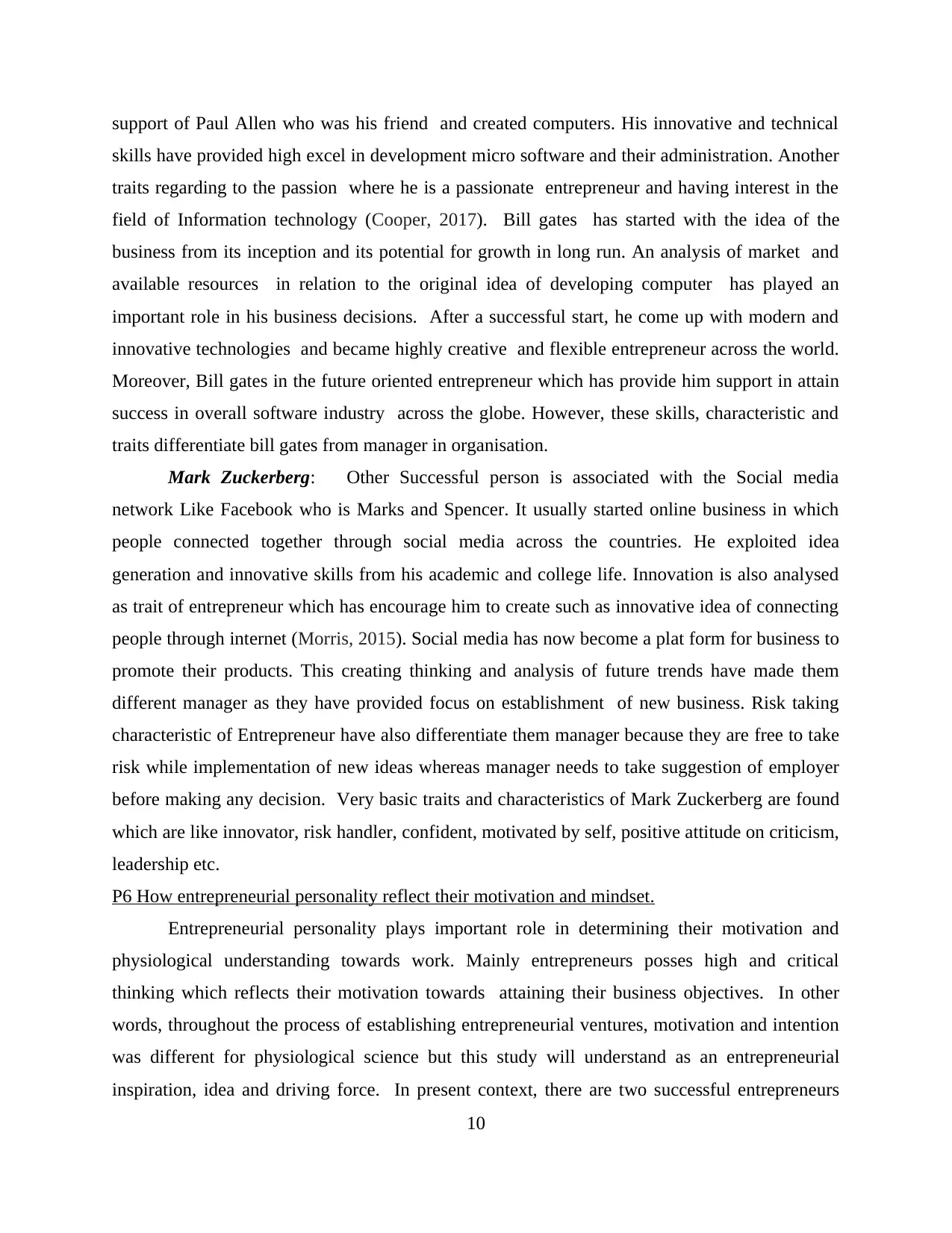
support of Paul Allen who was his friend and created computers. His innovative and technical
skills have provided high excel in development micro software and their administration. Another
traits regarding to the passion where he is a passionate entrepreneur and having interest in the
field of Information technology (Cooper, 2017). Bill gates has started with the idea of the
business from its inception and its potential for growth in long run. An analysis of market and
available resources in relation to the original idea of developing computer has played an
important role in his business decisions. After a successful start, he come up with modern and
innovative technologies and became highly creative and flexible entrepreneur across the world.
Moreover, Bill gates in the future oriented entrepreneur which has provide him support in attain
success in overall software industry across the globe. However, these skills, characteristic and
traits differentiate bill gates from manager in organisation.
Mark Zuckerberg: Other Successful person is associated with the Social media
network Like Facebook who is Marks and Spencer. It usually started online business in which
people connected together through social media across the countries. He exploited idea
generation and innovative skills from his academic and college life. Innovation is also analysed
as trait of entrepreneur which has encourage him to create such as innovative idea of connecting
people through internet (Morris, 2015). Social media has now become a plat form for business to
promote their products. This creating thinking and analysis of future trends have made them
different manager as they have provided focus on establishment of new business. Risk taking
characteristic of Entrepreneur have also differentiate them manager because they are free to take
risk while implementation of new ideas whereas manager needs to take suggestion of employer
before making any decision. Very basic traits and characteristics of Mark Zuckerberg are found
which are like innovator, risk handler, confident, motivated by self, positive attitude on criticism,
leadership etc.
P6 How entrepreneurial personality reflect their motivation and mindset.
Entrepreneurial personality plays important role in determining their motivation and
physiological understanding towards work. Mainly entrepreneurs posses high and critical
thinking which reflects their motivation towards attaining their business objectives. In other
words, throughout the process of establishing entrepreneurial ventures, motivation and intention
was different for physiological science but this study will understand as an entrepreneurial
inspiration, idea and driving force. In present context, there are two successful entrepreneurs
10
skills have provided high excel in development micro software and their administration. Another
traits regarding to the passion where he is a passionate entrepreneur and having interest in the
field of Information technology (Cooper, 2017). Bill gates has started with the idea of the
business from its inception and its potential for growth in long run. An analysis of market and
available resources in relation to the original idea of developing computer has played an
important role in his business decisions. After a successful start, he come up with modern and
innovative technologies and became highly creative and flexible entrepreneur across the world.
Moreover, Bill gates in the future oriented entrepreneur which has provide him support in attain
success in overall software industry across the globe. However, these skills, characteristic and
traits differentiate bill gates from manager in organisation.
Mark Zuckerberg: Other Successful person is associated with the Social media
network Like Facebook who is Marks and Spencer. It usually started online business in which
people connected together through social media across the countries. He exploited idea
generation and innovative skills from his academic and college life. Innovation is also analysed
as trait of entrepreneur which has encourage him to create such as innovative idea of connecting
people through internet (Morris, 2015). Social media has now become a plat form for business to
promote their products. This creating thinking and analysis of future trends have made them
different manager as they have provided focus on establishment of new business. Risk taking
characteristic of Entrepreneur have also differentiate them manager because they are free to take
risk while implementation of new ideas whereas manager needs to take suggestion of employer
before making any decision. Very basic traits and characteristics of Mark Zuckerberg are found
which are like innovator, risk handler, confident, motivated by self, positive attitude on criticism,
leadership etc.
P6 How entrepreneurial personality reflect their motivation and mindset.
Entrepreneurial personality plays important role in determining their motivation and
physiological understanding towards work. Mainly entrepreneurs posses high and critical
thinking which reflects their motivation towards attaining their business objectives. In other
words, throughout the process of establishing entrepreneurial ventures, motivation and intention
was different for physiological science but this study will understand as an entrepreneurial
inspiration, idea and driving force. In present context, there are two successful entrepreneurs
10
⊘ This is a preview!⊘
Do you want full access?
Subscribe today to unlock all pages.

Trusted by 1+ million students worldwide
1 out of 17
Related Documents
Your All-in-One AI-Powered Toolkit for Academic Success.
+13062052269
info@desklib.com
Available 24*7 on WhatsApp / Email
![[object Object]](/_next/static/media/star-bottom.7253800d.svg)
Unlock your academic potential
Copyright © 2020–2026 A2Z Services. All Rights Reserved. Developed and managed by ZUCOL.





